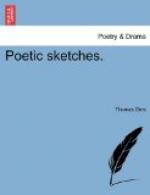Friend of the lonely hour, from thy lov’d strain
The magic pow’r of pleasure have
I known:
Awhile I lose remembrance of my pain,
And seem to taste of joys that long had
flown.
When o’er my suffering soul reflection casts
The gloom of sorrow’s sable-shadowing
veil,
Recalling sad misfortunes chilling blasts—
How sweet to thee to tell the mournful
tale!
And tho’ denied to me the strings to move
Like heavenly-gifted bards, to whom belong
The power to melt the yielding soul to love,
Or wake to war, with energetic song.
Yet thou, my Lyre, canst cheer the gloomy hour,
When sullen grief asserts her tyrant pow’r.
ADDRESS TO ALBION.
To thee, O Albion! be the tribute paid
Which sympathy demands, the patriot tear;
While echo’d forth to thy remotest shade,
Rebellion’s menace sounds in every
ear.
Though Gallia’s vaunts should fill the trembling
skies,
’Till nature’s undiscover’d
regions start
At the rude clamor;—yet, shouldst thou
despise,
While thy brave subjects own a common
heart.
But lo! fresh streaming from the Hibernian[*] height
Her own red torrent wild-eyed faction
pours;
While, ’mid her falling ranks, ignobly great,
Loud vengeance raves, and desperation
scours.
Denouncing murderous strife, the rebel train
Wave their red ensigns of inhuman hate
O’er every hamlet, every peaceful plain;
Rejecting reason, and despising fate.
Oh! that again our raptur’d eyes could see
Their ripening crops bloom yellow o’er
the land;
Their happy shepherds, like their pasture, free—
No more a factious race, a ruffian band.
That albion, once again with concord blest,
May still support that great, that glorious
name,
Which ardent glows in every patriot’s breast,
And crowns her hoary cliffs with matchless
fame.
Then, then, might foreign foes, around our shores,
Pour the big tempest of their arms in
vain;
Then, might they learn that freedom still is ours,
That Britons still control the subject
main.
Oh! all ye kindred pow’rs, awake, arise!
On boundless glory’s giant pinions
soar;
Let Gallia tremble! while the sounding skies
Proclaim us free—’till
time shall be no more!
[Footnote*: This piece was written when Ireland was in a most distracted state.]
SONNET.
ON THE DEATH OF
TOUSSAINT L’OUVERTURE.
His weary warfare done, his woes forgot,
Freedom! thy son, oppress’d so long,
is free:
He seeks the realms where tyranny is not,
And those shall hail him who have died
for thee!
Immortal TELL! receive a soul like thine,
Who scorn’d obedience to usurp’d
command:
Who rose a giant from a sphere indign,
To tear the rod from proud oppression’s




